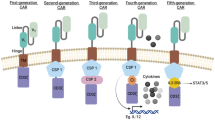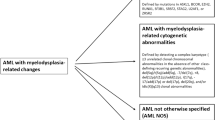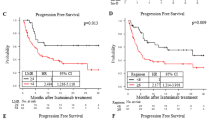Abstract
Adult T-cell leukemia–lymphoma (ATL) is classified into four clinical subtypes: acute, lymphoma, chronic, and smoldering. Chronic ATL is further divided into unfavorable and favorable chronic types according to serum lactate dehydrogenase, blood urea nitrogen, and serum albumin values. Acute, lymphoma, and unfavorable chronic types are categorized as aggressive ATL, whereas favorable chronic and smoldering types are categorized as indolent ATL. Intensive chemotherapy alone is not sufficient to prevent relapse of aggressive ATL. Allogeneic hematopoietic stem cell transplantation is a potential therapeutic option to cure aggressive ATL in younger patients. Reduced-intensity conditioning regimens have decreased transplantation-related mortality, and increased donor availability has dramatically improved transplant access. New agents, including mogamulizumab, brentuximab vedotin, tucidinostat, and valemetostat, have recently become available for patients with aggressive ATL in Japan. Here, I provide an overview of recent advances in therapeutic strategies for ATL.


Similar content being viewed by others
References
Iwanaga M, Watanabe T, Yamaguchi K. Adult T-cell leukemia: a review of epidemiological evidence. Front Microbiol. 2012;3:322. https://doi.org/10.3389/fmicb.2012.00322.
de Thé G, Bomford R. An HTLV-I vaccine: why, how, for whom? AIDS Res Hum Retroviruses. 1993;9(5):381–6. https://doi.org/10.1089/aid.1993.9.381.
Gessain A, Cassar O. Epidemiological aspects and world distribution of HTLV-1 Infection. Front Microbiol. 2012;3:388. https://doi.org/10.3389/fmicb.2012.00388.
Proietti FA, Carneiro-Proietti AB, Catalan-Soares BC, Murphy EL. Global epidemiology of HTLV-I infection and associated diseases. Oncogene. 2005;24(39):6058–68. https://doi.org/10.1038/sj.onc.1208968.
Shimoyama M. Diagnostic criteria and classification of clinical subtypes of adult T-cell leukaemia-lymphoma. A report from the Lymphoma Study Group (1984–87). Br J Haematol. 1991;79(3):428–37. https://doi.org/10.1111/j.1365-2141.1991.tb08051.x.
Katsuya H, Ishitsuka K, Utsunomiya A, Hanada S, Eto T, Moriuchi Y, et al. Treatment and survival among 1594 patients with ATL. Blood. 2015;126(24):2570–7. https://doi.org/10.1182/blood-2015-03-632489.
Katsuya H, Yamanaka T, Ishitsuka K, Utsunomiya A, Sasaki H, Hanada S, et al. Prognostic index for acute- and lymphoma-type adult T-cell leukemia/lymphoma. J Clin Oncol. 2012;30(14):1635–40. https://doi.org/10.1200/jco.2011.38.2101.
Fukushima T, Nomura S, Shimoyama M, Shibata T, Imaizumi Y, Moriuchi Y, et al. Japan Clinical Oncology Group (JCOG) prognostic index and characterization of long-term survivors of aggressive adult T-cell leukaemia-lymphoma (JCOG0902A). Br J Haematol. 2014;166(5):739–48. https://doi.org/10.1111/bjh.12962.
Fuji S, Yamaguchi T, Inoue Y, Utsunomiya A, Moriuchi Y, Uchimaru K, et al. Development of a modified prognostic index for patients with aggressive adult T-cell leukemia-lymphoma aged 70 years or younger: possible risk-adapted management strategies including allogeneic transplantation. Haematologica. 2017;102(7):1258–65. https://doi.org/10.3324/haematol.2017.164996.
Kataoka K, Iwanaga M, Yasunaga JI, Nagata Y, Kitanaka A, Kameda T, et al. Prognostic relevance of integrated genetic profiling in adult T-cell leukemia/lymphoma. Blood. 2018;131(2):215–25. https://doi.org/10.1182/blood-2017-01-761874.
Katsuya H, Shimokawa M, Ishitsuka K, Kawai K, Amano M, Utsunomiya A, et al. Prognostic index for chronic- and smoldering-type adult T-cell leukemia-lymphoma. Blood. 2017;130(1):39–47. https://doi.org/10.1182/blood-2017-01-757542.
Tsukasaki K, Tobinai K, Shimoyama M, Kozuru M, Uike N, Yamada Y, et al. Deoxycoformycin-containing combination chemotherapy for adult T-cell leukemia-lymphoma: Japan Clinical Oncology Group Study (JCOG9109). Int J Hematol. 2003;77(2):164–70. https://doi.org/10.1007/bf02983215.
Yamada Y, Tomonaga M, Fukuda H, Hanada S, Utsunomiya A, Tara M, et al. A new G-CSF-supported combination chemotherapy, LSG15, for adult T-cell leukaemia-lymphoma: Japan Clinical Oncology Group Study 9303. Br J Haematol. 2001;113(2):375–82. https://doi.org/10.1046/j.1365-2141.2001.02737.x.
Tsukasaki K, Utsunomiya A, Fukuda H, Shibata T, Fukushima T, Takatsuka Y, et al. VCAP-AMP-VECP compared with biweekly CHOP for adult T-cell leukemia-lymphoma: Japan Clinical Oncology Group Study JCOG9801. J Clin Oncol. 2007;25(34):5458–64. https://doi.org/10.1200/jco.2007.11.9958.
Toyoda K, Tsukasaki K, Machida R, Kadota T, Fukushima T, Ishitsuka K, et al. Possibility of a risk-adapted treatment strategy for untreated aggressive adult T-cell leukaemia-lymphoma (ATL) based on the ATL prognostic index: a supplementary analysis of the JCOG9801. Br J Haematol. 2019;186(3):440–7. https://doi.org/10.1111/bjh.15950.
Fuji S, Yamaguchi T, Inoue Y, Utsunomiya A, Moriuchi Y, Owatari S, et al. VCAP-AMP-VECP as a preferable induction chemotherapy in transplant-eligible patients with aggressive adult T-cell leukemia-lymphoma: a propensity score analysis. Bone Marrow Transplant. 2019;54(9):1399–405. https://doi.org/10.1038/s41409-019-0446-z.
Cook LB, Fuji S, Hermine O, Bazarbachi A, Ramos JC, Ratner L, et al. Revised adult T-cell leukemia-lymphoma International Consensus Meeting Report. J Clin Oncol. 2019;37(8):677–87. https://doi.org/10.1200/jco.18.00501.
Malpica L, Pimentel A, Reis IM, Gotuzzo E, Lekakis L, Komanduri K, et al. Epidemiology, clinical features, and outcome of HTLV-1-related ATLL in an area of prevalence in the United States. Blood Adv. 2018;2(6):607–20. https://doi.org/10.1182/bloodadvances.2017011106.
Imaizumi Y, Iwanaga M, Nosaka K, Ishitsuka K, Ishizawa K, Ito S, et al. Prognosis of patients with adult T-cell leukemia/lymphoma in Japan: a nationwide hospital-based study. Cancer Sci. 2020;111(12):4567–80. https://doi.org/10.1111/cas.14658.
Makiyama J, Imaizumi Y, Tsushima H, Taniguchi H, Moriwaki Y, Sawayama Y, et al. Treatment outcome of elderly patients with aggressive adult T cell leukemia-lymphoma: Nagasaki University Hospital experience. Int J Hematol. 2014;100(5):464–72. https://doi.org/10.1007/s12185-014-1665-0.
Fuji S, Fujiwara H, Nakano N, Wake A, Inoue Y, Fukuda T, et al. Early application of related SCT might improve clinical outcome in adult T-cell leukemia/lymphoma. Bone Marrow Transplant. 2016;51(2):205–11. https://doi.org/10.1038/bmt.2015.265.
Okamura J, Utsunomiya A, Tanosaki R, Uike N, Sonoda S, Kannagi M, et al. Allogeneic stem-cell transplantation with reduced conditioning intensity as a novel immunotherapy and antiviral therapy for adult T-cell leukemia/lymphoma. Blood. 2005;105(10):4143–5. https://doi.org/10.1182/blood-2004-11-4193.
Tanosaki R, Uike N, Utsunomiya A, Saburi Y, Masuda M, Tomonaga M, et al. Allogeneic hematopoietic stem cell transplantation using reduced-intensity conditioning for adult T cell leukemia/lymphoma: impact of antithymocyte globulin on clinical outcome. Biol Blood Marrow Transplant. 2008;14(6):702–8. https://doi.org/10.1016/j.bbmt.2008.03.010.
Choi I, Tanosaki R, Uike N, Utsunomiya A, Tomonaga M, Harada M, et al. Long-term outcomes after hematopoietic SCT for adult T-cell leukemia/lymphoma: results of prospective trials. Bone Marrow Transplant. 2011;46(1):116–8. https://doi.org/10.1038/bmt.2010.92.
Ishida T, Hishizawa M, Kato K, Tanosaki R, Fukuda T, Taniguchi S, et al. Allogeneic hematopoietic stem cell transplantation for adult T-cell leukemia-lymphoma with special emphasis on preconditioning regimen: a nationwide retrospective study. Blood. 2012;120(8):1734–41. https://doi.org/10.1182/blood-2012-03-414490.
Inoue Y, Nakano N, Fuji S, Eto T, Kawakita T, Suehiro Y, et al. Impact of conditioning intensity and regimen on transplant outcomes in patients with adult T-cell leukemia-lymphoma. Bone Marrow Transplant. 2021;56(12):2964–74. https://doi.org/10.1038/s41409-021-01445-0.
Hishizawa M, Kanda J, Utsunomiya A, Taniguchi S, Eto T, Moriuchi Y, et al. Transplantation of allogeneic hematopoietic stem cells for adult T-cell leukemia: a nationwide retrospective study. Blood. 2010;116(8):1369–76. https://doi.org/10.1182/blood-2009-10-247510.
Nakamura T, Oku E, Nomura K, Morishige S, Takata Y, Seki R, et al. Unrelated cord blood transplantation for patients with adult T-cell leukemia/lymphoma: experience at a single institute. Int J Hematol. 2012;96(5):657–63. https://doi.org/10.1007/s12185-012-1177-8.
Fukushima T, Itonaga H, Moriuchi Y, Yoshida S, Taguchi J, Imaizumi Y, et al. Feasibility of cord blood transplantation in chemosensitive adult T-cell leukemia/lymphoma: a retrospective analysis of the Nagasaki transplantation Network. Int J Hematol. 2013;97(4):485–90. https://doi.org/10.1007/s12185-013-1307-y.
Kato K, Choi I, Wake A, Uike N, Taniguchi S, Moriuchi Y, et al. Treatment of patients with adult T cell leukemia/lymphoma with cord blood transplantation: a Japanese nationwide retrospective survey. Biol Blood Marrow Transplant. 2014;20(12):1968–74. https://doi.org/10.1016/j.bbmt.2014.08.012.
Ito A, Nakano N, Tanaka T, Fuji S, Makiyama J, Inoue Y, et al. Improved survival of patients with aggressive ATL by increased use of allo-HCT: a prospective observational study. Blood Adv. 2021;5(20):4156–66. https://doi.org/10.1182/bloodadvances.2021004932.
Tanaka T, Nakamae H, Ito A, Fuji S, Hirose A, Eto T, et al. A phase I/II multicenter Trial of HLA-haploidentical PBSCT with PTCy for aggressive adult T cell leukemia/lymphoma. Transplant Cell Ther. 2021;27(11):92817. https://doi.org/10.1016/j.jtct.2021.07.010.
Gill PS, Harrington W Jr, Kaplan MH, Ribeiro RC, Bennett JM, Liebman HA, et al. Treatment of adult T-cell leukemia-lymphoma with a combination of interferon alfa and zidovudine. N Engl J Med. 1995;332(26):1744–8. https://doi.org/10.1056/nejm199506293322603.
Hermine O, Bouscary D, Gessain A, Turlure P, Leblond V, Franck N, et al. Brief report: treatment of adult T-cell leukemia-lymphoma with zidovudine and interferon alfa. N Engl J Med. 1995;332(26):1749–51. https://doi.org/10.1056/nejm199506293322604.
Bazarbachi A, Plumelle Y, Carlos Ramos J, Tortevoye P, Otrock Z, Taylor G, et al. Meta-analysis on the use of zidovudine and interferon-alfa in adult T-cell leukemia/lymphoma showing improved survival in the leukemic subtypes. J Clin Oncol. 2010;28(27):4177–83. https://doi.org/10.1200/jco.2010.28.0669.
Hodson A, Crichton S, Montoto S, Mir N, Matutes E, Cwynarski K, et al. Use of zidovudine and interferon alfa with chemotherapy improves survival in both acute and lymphoma subtypes of adult T-cell leukemia/lymphoma. J Clin Oncol. 2011;29(35):4696–701. https://doi.org/10.1200/jco.2011.35.5578.
Guery R, Suarez F, Lanternier F, Bougnoux ME, Lecuyer H, Avettand-Fenoel V, et al. Poor outcome and high prevalence of invasive fungal infections in patients with adult T-cell leukemia/lymphoma exposed to zidovudine and interferon alfa. Ann Hematol. 2021;100(11):2813–24. https://doi.org/10.1007/s00277-021-04622-9.
Sawada Y, Hino R, Hama K, Ohmori S, Fueki H, Yamada S, et al. Type of skin eruption is an independent prognostic indicator for adult T-cell leukemia/lymphoma. Blood. 2011;117(15):3961–7. https://doi.org/10.1182/blood-2010-11-316794.
Kameda T, Shide K, Tahira Y, Sekine M, Sato S, Ishizaki J, et al. Prognosis of indolent adult T-Cell leukemia/lymphoma. Viruses. 2022. https://doi.org/10.3390/v14040710.
Imaizumi Y, Iwanaga M, Nosaka K, Ishitsuka K, Ishizawa K, Ito S, et al. Validation of the iATL-PI prognostic index in therapeutic decision-making for patients with smoldering and chronic ATL: a multicenter study. Int J Hematol. 2023;117(2):206–15. https://doi.org/10.1007/s12185-022-03473-y.
Ishida T, Joh T, Uike N, Yamamoto K, Utsunomiya A, Yoshida S, et al. Defucosylated anti-CCR4 monoclonal antibody (KW-0761) for relapsed adult T-cell leukemia-lymphoma: a multicenter phase II study. J Clin Oncol. 2012;30(8):837–42. https://doi.org/10.1200/jco.2011.37.3472.
Ishida T, Jo T, Takemoto S, Suzushima H, Uozumi K, Yamamoto K, et al. Dose-intensified chemotherapy alone or in combination with mogamulizumab in newly diagnosed aggressive adult T-cell leukaemia-lymphoma: a randomized phase II study. Br J Haematol. 2015;169(5):672–82. https://doi.org/10.1111/bjh.13338.
Ishida T, Jo T, Takemoto S, Suzushima H, Suehiro Y, Choi I, et al. Follow-up of a randomised phase II study of chemotherapy alone or in combination with mogamulizumab in newly diagnosed aggressive adult T-cell leukaemia-lymphoma: impact on allogeneic haematopoietic stem cell transplantation. Br J Haematol. 2019;184(3):479–83. https://doi.org/10.1111/bjh.15123.
Shichijo T, Nosaka K, Tatetsu H, Higuchi Y, Endo S, Inoue Y, et al. Beneficial impact of first-line mogamulizumab-containing chemotherapy in adult T-cell leukaemia-lymphoma. Br J Haematol. 2022;198(6):983–7. https://doi.org/10.1111/bjh.18281.
Sakamoto Y, Ishida T, Masaki A, Murase T, Yonekura K, Tashiro Y, et al. CCR4 mutations associated with superior outcome of adult T-cell leukemia/lymphoma under mogamulizumab treatment. Blood. 2018;132(7):758–61. https://doi.org/10.1182/blood-2018-02-835991.
Tanaka N, Mori S, Kiyotani K, Ota Y, Gotoh O, Kusumoto S, et al. Genomic determinants impacting the clinical outcome of mogamulizumab treatment for adult T-cell leukemia/lymphoma. Haematologica. 2022;107(10):2418–31. https://doi.org/10.3324/haematol.2021.280352.
Fuji S, Inoue Y, Utsunomiya A, Moriuchi Y, Uchimaru K, Choi I, et al. Pretransplantation anti-CCR4 antibody mogamulizumab against adult T-cell leukemia/lymphoma is associated with significantly increased risks of severe and corticosteroid-refractory graft-versus-host disease, nonrelapse mortality, and overall mortality. J Clin Oncol. 2016;34(28):3426–33. https://doi.org/10.1200/jco.2016.67.8250.
Sakamoto H, Itonaga H, Sawayama Y, Furumoto T, Fujioka M, Chiwata M, et al. Treatment with mogamulizumab or lenalidomide for relapsed adult T-cell leukemia/lymphoma after allogeneic hematopoietic stem cell transplantation: The Nagasaki transplant group experience. Hematol Oncol. 2020;38(2):162–70. https://doi.org/10.1002/hon.2712.
Inoue Y, Endo S, Matsuno N, Kikukawa Y, Shichijo T, Koga K, et al. Safety of mogamulizumab for relapsed ATL after allogeneic hematopoietic cell transplantation. Bone Marrow Transplant. 2019;54(2):338–42. https://doi.org/10.1038/s41409-018-0291-5.
Ito T, Ando H, Suzuki T, Ogura T, Hotta K, Imamura Y, et al. Identification of a primary target of thalidomide teratogenicity. Science. 2010;327(5971):1345–50. https://doi.org/10.1126/science.1177319.
Lopez-Girona A, Mendy D, Ito T, Miller K, Gandhi AK, Kang J, et al. Cereblon is a direct protein target for immunomodulatory and antiproliferative activities of lenalidomide and pomalidomide. Leukemia. 2012;26(11):2326–35. https://doi.org/10.1038/leu.2012.119.
Ishida T, Fujiwara H, Nosaka K, Taira N, Abe Y, Imaizumi Y, et al. Multicenter phase II study of lenalidomide in relapsed or recurrent adult T-cell leukemia/lymphoma: ATLL-002. J Clin Oncol. 2016;34(34):4086–93. https://doi.org/10.1200/jco.2016.67.7732.
Tanaka T, Inamoto Y, Ito A, Watanabe M, Takeda W, Aoki J, et al. Lenalidomide treatment for recurrent adult T-cell leukemia/lymphoma after allogeneic hematopoietic cell transplantation. Hematol Oncol. 2022. https://doi.org/10.1002/hon.3115.
Bossard C, Dobay MP, Parrens M, Lamant L, Missiaglia E, Haioun C, et al. Immunohistochemistry as a valuable tool to assess CD30 expression in peripheral T-cell lymphomas: high correlation with mRNA levels. Blood. 2014;124(19):2983–6. https://doi.org/10.1182/blood-2014-07-584953.
Nakashima M, Yamochi T, Watanabe M, Uchimaru K, Utsunomiya A, Higashihara M, et al. CD30 characterizes polylobated lymphocytes and disease progression in HTLV-1-infected Individuals. Clin Cancer Res. 2018;24(21):5445–57. https://doi.org/10.1158/1078-0432.ccr-18-0268.
Horwitz S, O’Connor OA, Pro B, Illidge T, Fanale M, Advani R, et al. Brentuximab vedotin with chemotherapy for CD30-positive peripheral T-cell lymphoma (ECHELON-2): a global, double-blind, randomised, phase 3 trial. Lancet. 2019;393(10168):229–40. https://doi.org/10.1016/s0140-6736(18)32984-2.
Fujikawa D, Nakagawa S, Hori M, Kurokawa N, Soejima A, Nakano K, et al. Polycomb-dependent epigenetic landscape in adult T-cell leukemia. Blood. 2016;127(14):1790–802. https://doi.org/10.1182/blood-2015-08-662593.
Yamagishi M, Hori M, Fujikawa D, Ohsugi T, Honma D, Adachi N, et al. Targeting excessive EZH1 and EZH2 activities for abnormal histone methylation and transcription network in malignant lymphomas. Cell Rep. 2019;29(8):2321-37.e7. https://doi.org/10.1016/j.celrep.2019.10.083.
Izutsu K, Makita S, Nosaka K, Yoshimitsu M, Utsunomiya A, Kusumoto S, et al. An open-label, single-arm, phase 2 trial of valemetostat in relapsed or refractory adult T-cell leukemia/lymphoma. Blood. 2022. https://doi.org/10.1182/blood.2022016862.
Minucci S, Pelicci PG. Histone deacetylase inhibitors and the promise of epigenetic (and more) treatments for cancer. Nat Rev Cancer. 2006;6(1):38–51. https://doi.org/10.1038/nrc1779.
Sun Y, Hong JH, Ning Z, Pan D, Fu X, Lu X, et al. Therapeutic potential of tucidinostat, a subtype-selective HDAC inhibitor, in cancer treatment. Front Pharmacol. 2022;13:932914. https://doi.org/10.3389/fphar.2022.932914.
Utsunomiya A, Izutsu K, Jo T, Yoshida S, Tsukasaki K, Ando K, et al. Oral histone deacetylase inhibitor tucidinostat (HBI-8000) in patients with relapsed or refractory adult T-cell leukemia/lymphoma: phase IIb results. Cancer Sci. 2022;113(8):2778–87. https://doi.org/10.1111/cas.15431.
Tsukasaki K, Tobinai K. Human T-cell lymphotropic virus type I-associated adult T-cell leukemia-lymphoma: new directions in clinical research. Clin Cancer Res. 2014;20(20):5217–25. https://doi.org/10.1158/1078-0432.ccr-14-0572.
Sharma P, Allison JP. Immune checkpoint targeting in cancer therapy: toward combination strategies with curative potential. Cell. 2015;161(2):205–14. https://doi.org/10.1016/j.cell.2015.03.030.
Kataoka K, Shiraishi Y, Takeda Y, Sakata S, Matsumoto M, Nagano S, et al. Aberrant PD-L1 expression through 3’-UTR disruption in multiple cancers. Nature. 2016;534(7607):402–6. https://doi.org/10.1038/nature18294.
Ratner L, Waldmann TA, Janakiram M, Brammer JE. Rapid progression of adult T-cell leukemia-lymphoma after PD-1 inhibitor therapy. N Engl J Med. 2018;378(20):1947–8. https://doi.org/10.1056/NEJMc1803181.
Ishitsuka K, Utsunomiya A, Ishida T. PD-1 inhibitor therapy in adult T-cell leukemia-lymphoma. N Engl J Med. 2018;379(7):695. https://doi.org/10.1056/NEJMc1807852.
Jiang L, Yuan CM, Hubacheck J, Janik JE, Wilson W, Morris JC, et al. Variable CD52 expression in mature T cell and NK cell malignancies: implications for alemtuzumab therapy. Br J Haematol. 2009;145(2):173–9. https://doi.org/10.1111/j.1365-2141.2009.07606.x.
Sharma K, Janik JE, O’Mahony D, Stewart D, Pittaluga S, Stetler-Stevenson M, et al. Phase II study of alemtuzumab (CAMPATH-1) in patients with HTLV-1-associated adult T-cell leukemia/lymphoma. Clin Cancer Res. 2017;23(1):35–42. https://doi.org/10.1158/1078-0432.ccr-16-1022.
Kchour G, Tarhini M, Kooshyar MM, El Hajj H, Wattel E, Mahmoudi M, et al. Phase 2 study of the efficacy and safety of the combination of arsenic trioxide, interferon alpha, and zidovudine in newly diagnosed chronic adult T-cell leukemia/lymphoma (ATL). Blood. 2009;113(26):6528–32. https://doi.org/10.1182/blood-2009-03-211821.
Marçais A, Cook L, Witkover A, Asnafi V, Avettand-Fenoel V, Delarue R, et al. Arsenic trioxide (As(2)O(3)) as a maintenance therapy for adult T cell leukemia/lymphoma. Retrovirology. 2020;17(1):5. https://doi.org/10.1186/s12977-020-0513-y.
Suehiro Y, Hasegawa A, Iino T, Sasada A, Watanabe N, Matsuoka M, et al. Clinical outcomes of a novel therapeutic vaccine with Tax peptide-pulsed dendritic cells for adult T cell leukaemia/lymphoma in a pilot study. Br J Haematol. 2015;169(3):356–67. https://doi.org/10.1111/bjh.13302.
Watanabe T, Yamashita S, Ureshino H, Kamachi K, Kurahashi Y, Fukuda-Kurahashi Y, et al. Targeting aberrant DNA hypermethylation as a driver of ATL leukemogenesis by using the new oral demethylating agent OR-2100. Blood. 2020;136(7):871–84. https://doi.org/10.1182/blood.2019003084.
Author information
Authors and Affiliations
Corresponding author
Ethics declarations
Conflict of interest
The author declares that there is no conflict of interest.
Additional information
Publisher's Note
Springer Nature remains neutral with regard to jurisdictional claims in published maps and institutional affiliations.
About this article
Cite this article
Katsuya, H. Current and emerging therapeutic strategies in adult T-cell leukemia–lymphoma. Int J Hematol 117, 512–522 (2023). https://doi.org/10.1007/s12185-023-03572-4
Received:
Revised:
Accepted:
Published:
Issue Date:
DOI: https://doi.org/10.1007/s12185-023-03572-4




